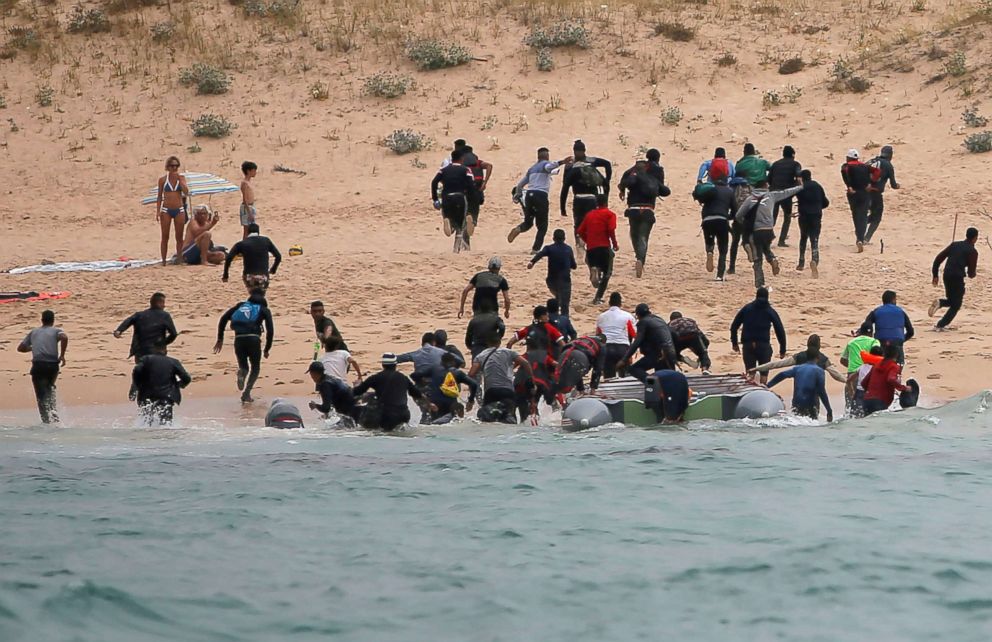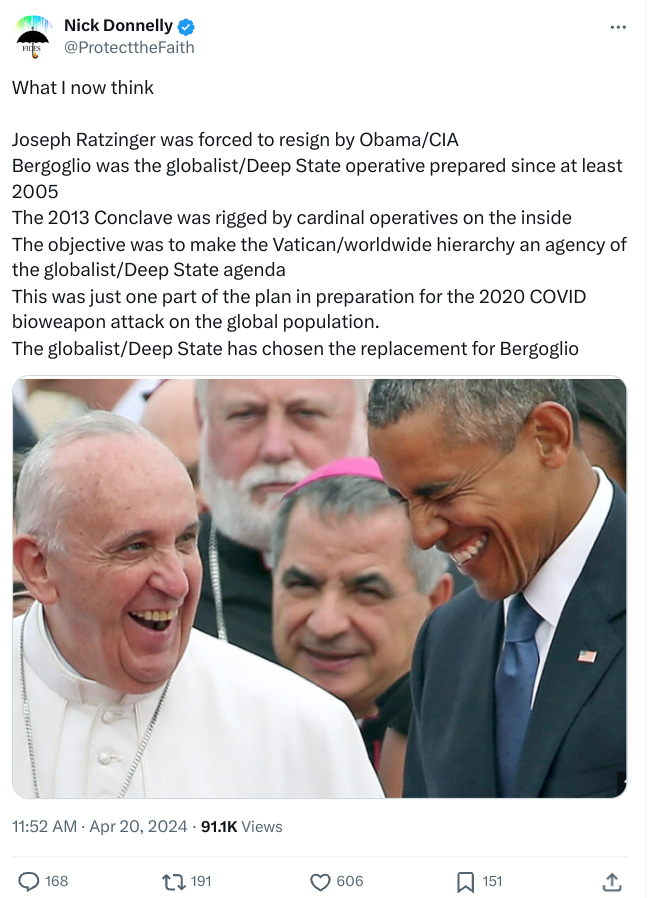THE CAMP OF THE SAINTS (Le Camp des Saints) By Jean Raspail CHAPTER FORTY FIVE
Forty-five
The waves that the storm sent lashing against the shore were few in all, but strong beyond belief. The fleet reeled beneath the first
vicious blow. The rest merely finished what the first had begun. Attacked from behind, the immense Calcutta Star was wrenched back
afloat with one shuddering heave of her giant hull. And as she was, a man was jarred awake. A man dozing, alone, at the foot of a
smokestack, wrapped in white rags, left to founder in the torpor of his utterly harmless folly. His Grace the Catholic bishop, prefect
apostolic to the entire Ganges region, opened his eyes. He gazed in wonder at the rain-swept deck. For the first time he saw a patchwork
of rusting metal, hidden all during the voyage by the thick-packed mass of sprawling bodies. The ship groaned out her hollow echoes,
like an empty tomb. And the storm whipped about through her truncated stacks, like organ pipes blasting out a hellish din, to a
counterpoint of croaking, creaking joints. Every one of her doors was opening and closing, slamming back and forth. For a moment the
hatchway covers would stand erect, then smash shut against the deck, as if the wind were fingering the keys of a giant bassoon, in an
infinite mélange of outlandish noises. All the spars, hawsers, ladders, nets, and gangways that the horde had clambered over as it poured
off the ship were beating out a rhythm on the sides of her hull, caught up in a kind of frenzied fandango. It sounded like a troop of
horsemen galloping full tilt over a metal bridge, or like hailstones bouncing off a sheet-iron roof, only a hundred times louder. The
bishop put his hands to his temples, clapped his palms against his ears so tightly that they hurt. At the same time he called out: “Where
are you? Where are you?” He was doubtless thinking of the little girls and boys who had brought him food and drink in the shadow of
his smokestack, and whom he would reward with a pat on the cheek, or a sign of the cross traced out on the forehead, depending on the
state of his reason at the moment. But the ship was empty. And empty, too, all the other ships around. Every ship in the armada … The
rain streamed down his bewildered face, slapped it so sharply with each fresh gust that he could barely breathe. Panting, he called again:
“Where are you? Where are you?” This time he was thinking of the little old ladies who had crawled to his side through the darkness,
and whose hands had brought him a taste of heaven on earth. Then the bishop understood that everyone had left him, and that he was all
alone. He began to weep like a baby, dropped his arms to his sides. And the uproar shattered his ears, knocked him senseless, like a
boxer with a deadly double hook.
He wasn’t out for long though, a few seconds at most. When he came to, he was down on all fours. The ship had given a sharp
lurch, and was listing. The shock, no doubt, had jolted him back to a semblance of sanity. Though not that it really mattered anymore:
the Calcutta Star, pulled free by the storm, was lying on her side. Her smokestacks split in two and were tumbling down into the sea.
The great organ was silent, and with it, the clack of the galloping hoofs, the spars and hawsers dancing about the hull. No sound now but
the swish of the water sweeping over the deck in great gushing cascades. He heard himself mutter, “We’ll both be relics together, only
on different sides, that’s all.” And he heard the Consul gasp, “In the name of the Lord, eat shit!” Or at least so he thought. The fact is,
the torrent that had battered the deck, splintering what was left of the ship’s superstructure, swept His Grace off as well, and all he could
see in the great liquid muddle were shadow dogs licking at a pool of blood on a shadow dock off by the port, in Calcutta. He struggled
against the flood, crashed into a winch that was somehow still in place. A bloodied hand passed before his eyes, and he knew that he was
dying, that the blood, this time, was his. No Latin words now for him to decipher … The bishop of the Ganges had turned quite sane,
saying simply, “My Lord, thy will be done.” Then his head went banging against the rails, and his body, hanging on for another split
second, hurtled into the sea, growing calmer by the moment … “Who are you?” a voice asked him, trying to sound gruff. “The bishop of
the Ganges.” “Hmm!” the voice responded, “that’s nothing to be proud of1 Well, at least did you repent for your sins before you died?”
“I think so.” “All right then, go on in! Everything’s forgiven … No, this way! Over here! … Just follow Baptitian and Podiatron, there.
They’ll show you the way …”
Nothing was left of the fleet but formless carcasses strewn along the shore. Today only one little torpedo boat still preserves a
vaguely recognizable shape. Every Easter Monday the regime decks it out in appropriate white bunting, and offers it up for public
veneration. The pilgrims come to the beach in droves, all day long, and file past in silence. Here, too, they’ve distorted historical fact,
making a spurious comparison with Cortés. (Albeit a Cortés who smashed his ships on landing, instead of one who burned them.) Given
such substance, the myth has acquired the stature of a well-conceived plan, a political decision in which every actor supposedly took part
by deliberate design. No longer a ragtag refugee horde, but a conquering army. And the schoolchildren gaze at the little torpedo boat,
drooling with pride. Some of us, though, aren’t taken in. Myself, for one. I know that a few more miserable minutes, and the storm
would have sunk every ship in the fleet, and sent their black passengers to the bottom of the sea. And I know too that God failed to give
us those minutes, those moments of grace …
That brief lapse of time caused one final result. Just as the storm was beginning to die down, two planes approached the airport, and
prepared for a visual landing. Visual for good reason. It didn’t take long for the pilots to realize that nothing and no one was left on the
ground. Not a sound from the tower, not a car in the lots, no approach lights burning, no radio beacon. Still, in spite of the storm, there
was no turning back. Loaded with medicines and relief supplies, cram- packed as well with commandos of the cloth—squeezed between
mountains of crates and cases—the two planes, undaunted, banked around for their landing, outlined against the darkened sky. The first
one was white. The second one, gray. No doubt the reader knows already who was in them: our militant musketeers of Christian charity,
those all-out sword-rattling Third World do-gooders, the holy heroes of São Tomé. Number one, the Pope’s white Vatican plane!
Number two, the gray plane of the World Council of Churches! Not a one of the flying padres had been able to resist the tortuous call of
justice. As ever, their cargoes were nothing but a pretext. What really mattered was to get there first, and by their symbolic presence to
give up the keys to the West, to offer them up in joyous abnegation, and let the new world come to life at last. But cyclones’ tails can
play treacherous tricks. The storm, as it died, struck one last blow. A thick black cloud swallowed up the mini-squadron, and sent its
thunderbolts crackling around it. Every light went out, every instrument dial took a sudden plunge to zero. What one does in such cases
is to step on the gas and head for open sky. Which is what the pilots tried to do, as the blackness hemmed around them. But the eye of
the cyclone was watching and waiting. Gigantic air pocket, shaped like a chimney. At such a low altitude, rare as it is, it never spares its
victims. One after the other, almost docile to a fault, still respecting their traditional order of arrival, the two planes went crashing down
onto the runway. Number one, the white! Number two, the gray! Explosion. Fire. And no witnesses to see it, except old Monsieur
Calguès, that is, behind his spyglass, smiling. No survivors either. God had denied His people their few miserable minutes of grace, yet
He claimed His due in lives all the same …
Afterwards, certain historians—though only a few—put forth a startling theory. To wit, that Pope Benedict XVI was aboard the
white plane, and had died in the crash. Since only charred bones were found in the wreckage—no clothing, no personal objects of any
kind—the speculation remained just that. (Wholly unsupported, except for the fact that His Holiness, indeed, was never heard from
again. It was as if he had vanished into thin air, somewhere in the maze of the Vatican’s garrets. After that Good Friday message of his,
dripping with brotherhood and universal love, he had simply and literally dropped out of sight. We were told at the time that he was
closeted in prayer, in a self-imposed exile under the eaves.) In point of fact, a spur-of-the- moment trip wouldn’t really have been out of
character at all. Three times in the past, in an effort to restore the faith in his office lost by his less-than-adventurous predecessor, this
pontiff had manned the white plane himself, and flown to some battlefield to land in the thick of the fighting. In Rhodesia, for
example—where Jean Orelle, too, had distinguished himself, you may recall—his spectacular arrival had led to the fall of Salisbury.
Striding alone through the no-man’s-land on the outskirts of the city, he had blatantly turned his back on the besieged white handful and
had blessed the horde of black attackers. (It should, in all fairness, be mentioned that his presence did keep the victors from hacking their
foes to shreds.) On his last trip—to South Africa, at the time of the famous native rebellion and general strike—he had almost managed
to pull it off again. He had found himself mobbed by an adoring crowd of animist Bantu tribesmen and leftist Boer students, who
worshipped the ground he walked on. Suddenly a police corporal, probably none too bright, threw a wrench into the works, just in the
nick of time. Grabbing the Pope by the shoulders and shielding himself behind him, he had dragged him bodily off to his car, then out to
the airport, shouting all the while to the rioting crowd, “Try to stop me, and I’ll drill him!” The whole world shuddered in righteous
indignation. … All of which explains why the notion of His Holiness flying off to the Ganges armada, and burning alive in his plane, is
one that I have no trouble accepting. In fact, I must say that, from many points of view, it’s one that I even find rather delightful …







Comments
Post a Comment